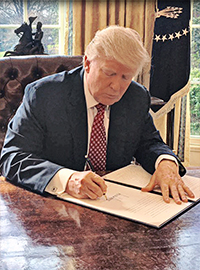| What's Behind Trump's New Executive Actions |
 |
|
By Byron York
Wednesday, October 18 2017 |
President Trump's most recent high-profile executive actions—on Obamacare, immigration and the Iran nuclear deal—do three big things. First, they push Congress to act, which involves more than just calling the bluff of Republican leaders who talked big during the Obama years but failed to produce once the GOP controlled both Congress and White House. In a larger sense, Trump's actions point toward restoring a proper balance of power in which Congress makes law on issues that are clearly its constitutional responsibility. The president is using executive authority to pressure lawmakers to exercise appropriate legislative authority. Second, Trump has reinforced what many of his supporters find most appealing about him—that he can act as a leader not clearly aligned with either party. And third, Trump's actions galvanize support among some of Washington's most conservative lawmakers and thinkers, even some who have been highly critical of him in the past. On the first point, Trump is pressing Congress to act in areas in which Republicans accused Barack Obama of executive overreach. On Obamacare, Trump cut off the flow of cost-sharing reduction, or CSR, payments to insurance companies. The expenditures were never appropriated by Congress; the Obama administration carried them out to keep Obamacare afloat, regardless of the law. Now Trump has set the stage for a constitutional fix. On DACA, Obama's Deferred Action for Childhood Arrivals program, Trump has challenged Congress to come up with a legitimate fix to an Obama executive action that all Republicans saw as overreach. And on the Iran deal, Trump's action opens the door for action in Congress, where Republicans said the issue always belonged, after Obama bypassed lawmakers. "Each action undoes what Obama ought not have done without Congress (CSRs, DACA and Iran)," said a conservative lawmaker in a text exchange recently. "Restore constitutional government!" On the second point, Trump's actions highlight the fact that a lot of his supporters still see him not as an insider but as an outside force pushing an entrenched, sclerotic Republican Party to act. That was candidate Trump's pitch to voters, going way back. "Trump is about the closest thing to a third-party candidate without having to leave the party," Chuck Laudner, who ran Trump's Iowa campaign, told me in May 2015, when crowds were starting to take Trump seriously. Not much has changed since then. "To a huge chunk of the electorate, Trump is not a Republican," a veteran GOP operative told me recently, after attending focus groups in several states key to next year's midterms. That's also consistent with what Stanley Greenberg, the Democratic pollster, found over the summer in a Macomb County, Michigan focus group. "What many Macomb voters value about Trump is that he represents an unaligned force in American politics," wrote the Atlantic's Franklin Foer of Greenberg's findings. It's a scenario in which the GOP leaders of Congress are the villains. When Greenberg showed those Michigan voters photos of Senate Majority Leader Mitch McConnell and House Speaker Paul Ryan, they became visibly angry. That's also what the veteran Republican operative found. "Trump's supporters think it's amazing he's getting so much accomplished, seeing how Ryan and McConnell are trying to screw him every day," the operative told me. Finally, on the third point, Trump is getting high marks from some conservative Republicans and thinkers. When I asked one deeply conservative lawmaker, who in turn polled what other members had told him, he said they are glad to see the president putting Republicans to the test: Will they just talk like conservatives, or will they actually legislate like conservatives? Some conservative writers who have long criticized Obama's unilateral actions were happy to see Trump begin to undo them. On Obamacare, National Review—which published an "Against Trump" issue in the primaries and has had a bumpy relationship with the president since—reacted with an editorial headlined "Trump's Sensible Health-Care Actions." On DACA, a lot of conservatives slammed Trump when there were reports he had reached a "deal" with Democrats Charles Schumer and Nancy Pelosi. But now that Trump has attached a wish-list of tough border and interior enforcement priorities to any DACA legalization, many see it as a chance for Congress to take actual action on immigration. (And even if Republicans cave and pass a simple legalization, doing it through Congress would still be a constitutional solution, unlike Obama's original action.) On the nuclear deal, the Weekly Standard, which has at times been a center of NeverTrumpism, published a reaction with the headline, "He's right about Iran." "We believe (Trump's) instincts are sound," the magazine's editors wrote. Trump's actions might not work. After all, he is pressuring Congress to act, but that doesn't mean Congress will act, especially when the president is feuding with some key members. But Trump's moves are a step in the direction of fixing some of the worst excesses of the Obama administration—if Republicans will take the opportunity. Byron York is chief political correspondent for The Washington Examiner. |
Related Articles : |
























